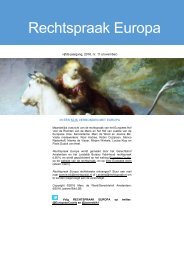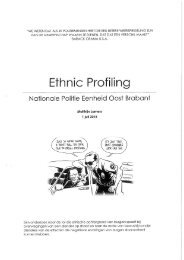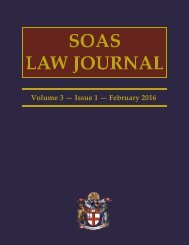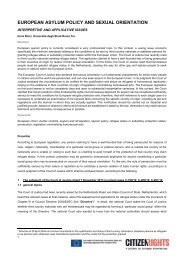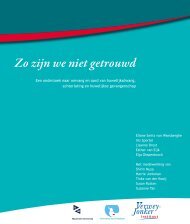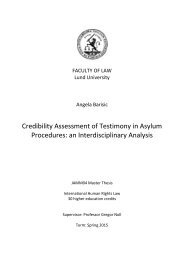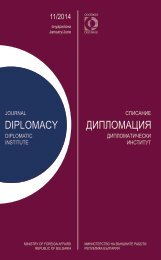AEMI
AEMI-2016-web
AEMI-2016-web
You also want an ePaper? Increase the reach of your titles
YUMPU automatically turns print PDFs into web optimized ePapers that Google loves.
172 <strong>AEMI</strong> JOURNAL 2015 2016<br />
manian and Bulgarian citizens in 2010.<br />
14 For example, the French Défenseur des droits, the<br />
French Commission nationale consultative des<br />
droits de l’homme, the European Commission,<br />
the European Parliament, Commissioner for<br />
Human Rights and the European Committee of<br />
Social Rights of the Council of Europe.<br />
15 See, for example, decisions of French Administrative<br />
court of appeals of Lyon of 2. 5. 2012,<br />
of 16. 5. 2012, No 1203741, No 1203740, No<br />
1201114 as well as of Douai of 25. 10. 2012, No<br />
12DA00853.<br />
16 Indeed, workers benefit from a total unconditional<br />
freedom of movement and residence for short and<br />
long-term stays. On the contrary, freedom of<br />
movement and residence of economically inactive<br />
Union citizens is conditional to the respect of<br />
some requirements laid down by the Citizenship<br />
Directive from 2004:<br />
· For stays up to three months, the directive reminds<br />
that they should not be an unreasonable<br />
burden on the social assistance system of the host<br />
Member state.<br />
· For stays more than three months, their right of<br />
residence is conditional to the fulfillment of two<br />
requirements:<br />
- The possession of sufficient financial resources<br />
to support themselves and their family members<br />
(Article 7-2 and Article 8-4), the aim being again<br />
not becoming an unreasonable burden for the host<br />
Member State.<br />
- The possession of comprehensive sickness insurance.<br />
The insurance’s form (private or public) and<br />
origin (from the host Member state or another<br />
State) are not relevant as far as the insurance covers<br />
the territory of the host State and provides for<br />
a comprehensive coverage.<br />
· Concerning the last type of residence, the permanent<br />
residence, economically inactive Union citizens<br />
should demonstrate a first legal stay five years<br />
in the host Member State, a right which is opened<br />
just to the self-sufficient inactive residents.<br />
17 If workers on the move benefit from a total equality<br />
of treatment with nationals of the host Member<br />
state, economically inactive Union citizens are<br />
not automatically entitled to social assistance:<br />
- Generally speaking, during the first three months<br />
of their stay, the host Member state is not obliged<br />
to grant them any social assistance.<br />
- Then, job seekers are not entitled to social assistance<br />
during the period of active search of a job<br />
which might be longer than three months.<br />
- Students are not entitled to grants or loans before<br />
the acquisition of the permanent residence.<br />
18 Contrary to other Member States which focus on<br />
a certain category of Union citizens, specifically<br />
Romanian and Bulgarian citizens, Belgian expulsions<br />
do not differentiate between citizens of poor<br />
or rich countries of origin: expulsion orders concern<br />
indifferently French, Spanish, Italian, Dutch,<br />
Romanian or Bulgarian citizens.<br />
19 Article 7-3c retains the status of worker for a period<br />
of six months to any job-seeker duly registered<br />
who has been involuntary unemployed after<br />
having worked for less than 12 months in the host<br />
Member state.<br />
20 According to case Udo Steymann v Staatssecretaris<br />
van Justitie (C-196/87), activities constitute<br />
economic activities in so far as the services may be<br />
regarded as the indirect quid pro quo for genuine<br />
and effective work.<br />
21 See Carlo Caldarini, Les expulsions de citoyens<br />
et citoyennes européens. Un phénomène qui<br />
nous alarme, et nous mobilise, Observatoire des<br />
politiques sociales en Europe, May 2014, online<br />
http://www.osservatorioinca.org/section/image/<br />
attach/Carte_blanche_-_Open_brief_-_Lettera_<br />
aperta.pdf.<br />
22 See Libre circulation des citoyens européens : du<br />
mauvais usage par la Belgique de ses banques de<br />
données sociales, 5.2.2015, online http://www.<br />
lalibre.be/debats/opinions/libre-circulation-descitoyens-europeens-du-mauvais-usage-par-labelgique-de-ses-banques-de-donnees-sociales-<br />
54d36df135701001a18fe98b.<br />
23 For more details on freedom of movement of<br />
homeless people in Europe, see FEANTSA- Fédération<br />
Européenne d’Associations Nationales<br />
Travaillant avec les Sans-Abri, Libre circulation et<br />
sans-abrisme, Printemps 2013.<br />
24 Permanent residents are protected against the<br />
ground of „normal“ public policy. They can be expelled<br />
on the ground of „serious“ grounds of public<br />
policy. Member States are supposed to clearly<br />
differentiate „normal“ and „serious‘ grounds of<br />
public policy on which the expulsion can be taken.<br />
25 Ten year residents cannott be indeed expelled on<br />
the ground of public policy or public health and<br />
not even on the ground of public security. Just<br />
imperative grounds of public security can apply<br />
to them. Member States are supposed to clearly<br />
differentiate in their national legislation „normal“<br />
grounds of public security and „imperative“<br />
grounds of publi security.<br />
26 See General Report: Union Citizenship: Development,<br />
Impact and Challenges. / Shaw, Jo; Nic<br />
Shuibhne, Niamh. Union Citizenship: Development,<br />
Impact and Challenges, The XXVI FIDE<br />
Congress in Copenhagen, 2014 Congress Publications<br />
Vol. 2. ed. / Ulla Neergaard; Catherine



